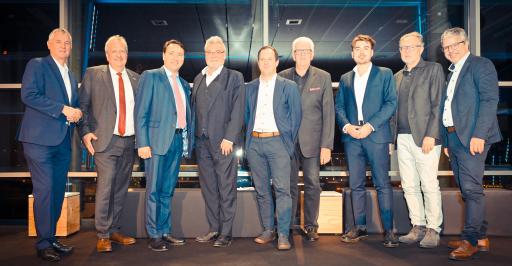At the specialist symposium “PROMOTE HOUSING CONSTRUCTION. WHAT TO DOYesterday, representatives from science, the real estate industry and politics discussed the pressing challenges in subsidized housing at the Ars Electronica Center in Linz. Organized by Housing Promotion Association (VWBF), the event sent a clear signal for the importance of non-profit housing and discussed measures to strengthen subsidized housing.
Parties are committed to strengthening subsidized housing
The focus of the panel discussion was – after the keynote speech by the AK President Andreas Stangl and the scientific lectures by Angela Pfister (ÖGB), Andreas Huber (WU Vienna) and Christoph Schremmer (Austrian Institute for Spatial Planning) – the urgent question of sustainable financing of subsidized housing. Given rising construction costs, tighter lending and an overheated property market, there was consensus on the need for comprehensive financial support.
The discussion, moderated by Standard-Journalist Franziska Zoidlbrought together leading representatives of the industry and politics: Klaus Baringer (Chairman of the Association of Non-Profit Building Associations, GBV), Gerald Gollenz (Chairman of the Association of Real Estate and Asset Trustees), Manfred Haimbuchner (Deputy State Governor Upper Austria, FPÖ), Georg Niedermühlbichler (SPÖ member of the state parliament in Vienna and President of the Austrian Tenants’ Association) as well Georg Prack (Housing, housing and urban renewal spokesperson, GRÜNE Vienna).
Call for housing subsidies to be increased to 1% of GDP
There was a broad consensus among the discussion participants in calling for an increase in housing subsidies to at least 1% of GDP. The current share of housing subsidies in GDP is around 0.4 to 0.5. An increase to 1% of GDP would mean around 2.5 billion euros in additional funding annually. Money that would be urgently needed for the construction and renovation of affordable housing. At the same time, participants emphasized the need to overcome ecological challenges, in particular the decarbonization of existing buildings by switching heating to renewable energy sources.
Coexistence of subsidized rent and ownership
A central consensus was that the focus should be on the construction of rental housing, but also property ownership, in order to meet the different needs of the population. economist Andreas Huber from the Vienna University of Economics and Business made it clear in his lecture that a needs-based distribution key in Austria should be around 4/5 rent and 1/5 property. In view of the sharp increase in real estate prices, which have not kept pace with wage increases for a long time, Huber advocated a clear commitment to subsidized rental housing construction: “An affordable rental housing stock creates social assets and is the more sustainable model in the long term.”
Earmarking of housing subsidies is required
Another central topic of the event was the earmarking of housing subsidies. In particular, the housing subsidy contribution, half of which is financed by employees and half by employers over one percent of the gross wage bill, must be used for the purpose of housing construction and must not flow into other budgets – in a way that is not intended for its intended purpose. Such earmarking could bring in an additional 700 million euros annually for subsidized housing.
Alliance for Affordable Housing
“The challenges in housing construction can only be overcome through a joint effort by politics, business and civil society. “Today’s event clearly shows that the need for strong housing subsidies in Austria is undisputed,” emphasized Michael Gehbauerchairman of the VWBF. “Now it is important to implement the formulated demands into concrete political measures in order to ensure affordable housing in the future.”
Background to the specialist symposium
The event offered a platform for exchange between politics, the real estate industry and science. In view of rising interest rates and property prices, the participants discussed sustainable strategies to strengthen subsidized housing. The VWBF appeals to all political forces, but especially to the future federal government, to incorporate the results of the symposium into future housing policy.
